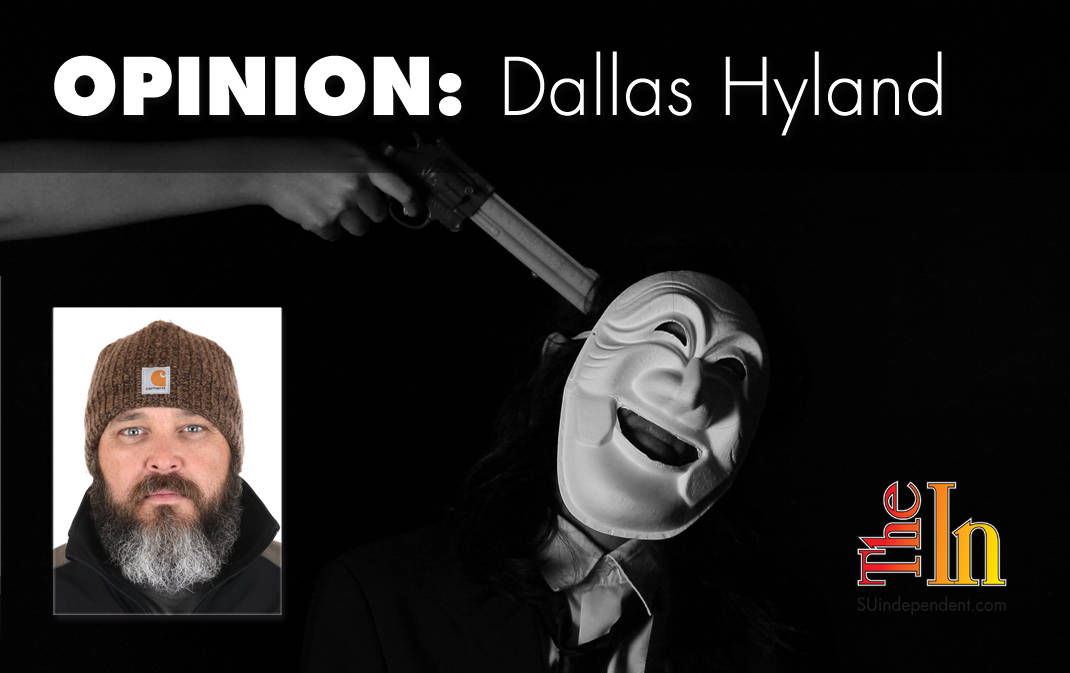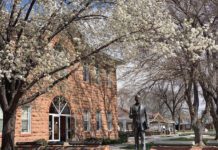 This week during my regular guest spot on the Kate Dalley show on 1450 KZNU, I alluded to the coming of the piece you are now reading, the impetus being that I think this is a bit of information of grave importance to the community as a whole and worthy not only of a political opine but a hearty and rigorous discussion.
This week during my regular guest spot on the Kate Dalley show on 1450 KZNU, I alluded to the coming of the piece you are now reading, the impetus being that I think this is a bit of information of grave importance to the community as a whole and worthy not only of a political opine but a hearty and rigorous discussion.
The Dixie Sun, Dixie State University’s campus newspaper published a story online by Dianna Fossett on Aug. 19 that included interviews with members of administration, school attorney Doajo Hicks, and former professor Varlo Davenport.
The story is written well, and although the title seems to imply that it will be about the possible pending litigation against DSU by Davenport, it comes off very much like a press release from the administration in my opinion. Have a read and see what you think.
Being critical of a journalists’ work isn’t something I do lightly. Fossett wrote a good piece. But the paper touts itself as being the “Voice of Dixie State University,” and it naturally begs the question: Did Fossett feel compelled to pursue this story, or is this in fact a press release orchestrated by the administration? (One minor caveat to Fossett would simply be the need for the word “alleged” in front of “hair-pulling incident.”)
But given a conversation I had with an editor at the paper over the summer, I would assert here that perhaps the administration is a little heavy-handed in the dissemination of information by that paper.
Spencer Ricks confirmed that the administration has on occasion recently directed the paper not to interview certain people without its consent, an act mind you that is categorically a First Amendment violation.
For a school that is racking up “alleged” as well as quantified First Amendment violations, it is confounding that it would do such a thing to a newspaper. However, these are student journalists. Perhaps they do not know better. Maybe the director of the paper does, but who knows?
But I digress.
And, I know what you might be thinking. How many pieces is this guy going to do on Dixie State University?
My answer, sadly, is “as many as it takes.”
The fact is that there is a systemic, culturally pandemic, and socially unacceptable element within that university — its administration, its governing body, and its local affiliations — that is a danger not only to those who work and attend there but to this community and to academia as a whole that simply must be relentlessly and tirelessly exposed until it is excised by way of said exposure and legal actions, not only the integrity of the institution but the betterment of the community it is supposed to serve.
And in part, the expressed purpose of this opine is to take some of that element to task by way of responding to statements made in the article.
At first read, the article seems to be an attempt by DSU to soften the blow of the press release issued by the school shortly after a verdict of “not guilty” was rendered in the Davenport assault trial.
The school and the city’s attorney still have to be somewhat bewildered by the fact that they were handily and summarily beaten in court by a little-known thing around here known as the law.
Defense attorney Aaron Prisbrey walked city attorney Robert Cosson right into a wall by waiting until the very end of the trial to simply point out that not a single one of the three elements necessary for a conviction in a simple assault case had been proven, let alone presented.
The question needing to be begged here is just how exactly Cosson or the city even came up with the conclusion to prosecute at all. The answer, although glaringly obvious, could prove to be legally troublesome for both entities in the future.
“DSU General Counsel Doajo Hicks said it was time for the university to speak, as it could not during the legal proceedings,” Fossett says in her article.
What is ironic is that it had been speaking all along — by way of its actions, that is. By way of the Assistant to the Attorney General and counsel for DSU engaging in possible illegal conduct with Judge Ron Read to redact and/or suppress pertinent evidence. By its obstinance in providing legitimate discovery to the defense. By way of its campus police being documented in creating investigatory material outside of a legitimate and legal timeline.
Hicks may be spinning things to say that the university was being compliant with ethical standards in legal proceedings, but the stark hypocrisy of that assertion is something to marvel at for sure.
But a question that definitively needs to be answered, in spite of the fact that the press release by default represents the entire school, the board of trustees, the board of regents, and the mayor — who sits on the board of trustees, which by default means the city of St. George itself — is this: Who actually wrote the university’s official statement released after the conclusion of the Davenport trial?
I mean seriously, who the hell wrote that and actually thought it was a good idea?
At another point in the article, Fossett wrote that there was a point of contention about Davenport’s potential other issues. This was where the press release tried to say that there was another, other, other, other shoe, besides the shoe that President Biff Williams said would drop, that was now okay to drop … now that the shoe that they dropped flopped, (the bullshit assault charge), and that this other shoe drop was yet another unsubstantiated allegation, created after the fact, that Davenport had been aggressive towards faculty.
“The university would not comment on whether or not Davenport’s explanation of his informal probation was the case,” wrote Fossett. “Hicks said he was unable to comment on Davenport’s employment record under Utah law.”
Apparently, libelous blanket accusations of perjury that are wholly unsubstantiated are fair game within Hicks’ interpretation of the law. Because those were exactly what the press release made.
But what is interesting is that the one person who was caught red-handed committing perjury under oath was DSU’s own campus police chief and investigator in the Davenport trial, Don Reid. Reid lied under oath about the existence of a camera in the classroom.
Hicks, you saw that right? Because everyone else sure as hell did.
But he doesn’t.
“Possible legal action aside, Hicks said the outrages expressed by local papers like The Independent and blogs were in the minority,” Fossett wrote in her article.
Presuming this to be so, and it might well be, the question is this: What is your point, Hicks?
Just because the opinion that the school is engaging in malicious and unsubstantiated legal proceedings that may prove in federal court to be unlawful and perhaps unconstitutional is reported by a small paper, does that make those claims untrue? How is it that you do not see that by such a non sequitur you simply appear to be changing the subject and avoiding the point? How about an actual refutation of a fact presented and opined on? My number and email are readily available, and I eagerly await your call.
“The majority of the response that we have received have approved of our actions and have backed the university,” said Hicks in Fossett’s piece.
“He said the university has continued to have a positive image in the community, and DSU is continuing to be a positive influence in the surrounding community,” adds Fossett.
Again, the point? Since you are popular, you do not have to abide the law?
“To support this statement, Director of Public Relations Jyl Hall said, ‘We are welcoming a larger incoming freshman student class this year, and university events are very well attended by the community,’” wrote Fossett.
By law of averages, perhaps a good question is to first ask how many of these people will actually make it to graduation, because DSU’s retention and graduation rates are pretty low. But more importantly, how many people will be subjected to the McCarthyesque hearings? (Ones like the one that we’ll get in to here in a minute.)
But perhaps the scariest thing of all is what the school’s new lawyer used to justify everything:
“Hicks said the uproar and negativity was local, but that the board of trustees and board of regents were in support of the university.”
That much is obvious.
When a member of the board of regents forwarded emails sent to him in confidence by DSU faculty concerning the firing of Davenport, and he summarily sent them within minutes to the very person the concerns are about — President Biff Williams — he showed what kind of support Hicks refers to.
When members of the board of trustees met with Washington County Attorney Brock Belnap to presumably have an influence on the attorney to take up a charge against Davenport, they showed what kind of support Hicks refers to.
It is readily apparent not only that the two boards categorically support the misuse of policies and laws but that they aid and abet in carrying it out. So when Hicks says that the school has the support of the boards, it is true. The question is whether such support is ethical, legal, and in the best interest of the school and the community. Or is it in the best interest of something else?
But to add to the host of disconcerting things in this scenario, the school also has the support of the Utah Attorney General by way of State Risk Management. This office is currently in litigation for violations scarily identical to the things that keep happening here, which indicates that the Attorney General’s primary role here is to bail the school out but do nothing to clean it up. The school appears to have an unexpirable insurance policy that settles cases for it without investigating or imposing sanctions on egregious, unethical, and litigious behavior.
Unless this changes, things like the recent wrongful expulsion of yet another student will be standard operating procedure for DSU, one that has haunting and glaring similarity to multiple expulsions and firings like the one levied upon Davenport.
Fossett wrote:
“Davenport was a small aspect, not unimportant, but one speed bump that we dealt with,” Hicks said. “Once the trial was over with, which I think everyone wanted finality on it, we’ll wait and see about a lawsuit.”
I think perhaps Hicks has it wrong. In the grand scheme of things, Hicks and the administration he thugs for is the proverbial speed bump in the path of DSU becoming the fine institution it needs to be.
But again, I digress.
Within the last two weeks, DSU expelled a student under suspicious circumstances after said student filed two title IX complaints.
In an appeal notice from Prisbey, the student’s attorney, he wrote that School of Visual and Performing Arts Dean Jeff Jarvis “sent a complaint letter to [Dean of Students] Del Beatty alleging ‘specific incidents of unprofessional conduct,’ requesting that [the student] be ‘suspended from DSU, and perhaps expelled’ pursuant to ‘Policy 552, Student Right and Responsibilities, Section 2, Student Conduct.’ Jarvis alleged that [the student] had engaged in ‘inappropriate use of DSU title IX processes to intimidate faculty members,’ made an unauthorized copy of a key to the [undisclosed] area, was intoxicated at a DSU event, stalked [a faculty member] and was insubordinate toward DSU faculty.”
The initial and foremost allegation, the inappropriate use of title IX, precedes the other three somewhat vague allegations that under policy were stale, which is to say that Jarvis did not bring these allegations up until the after the expired 45 days and within a week of the student filing title IX complaints.
It is worth noting here that Jarvis was instrumental in the illegitimate firing of Davenport.
Prisbey continued:
“The illegitimacy of what Dean Jarvis did cannot be understated. It is unlawful for a university, under any circumstance, to initiate disciplinary proceedings against a student for filing a title IX complaint, regardless of the merits of the complaint pursuant to the United States Supreme Court ruling in Jackson v. Birmingham Board of Education. It is beyond comprehension that anyone in academia would put in writing his intent to discipline a student for filing a title IX complaint.”
The ensuing events would include the mysterious and undocumented redaction of the title IX allegations while the other three were carried through with as though they were legitimate.
Furthermore, since the expulsion, the university has curiously granted the student with a degree by way of some ten exceptions to the academic rigor of said degree. In other words, they passed the student on classes not yet completed for the degree and awarded what is tantamount to a worthless degree, a placation the student neither wants nor feels good about.
And in a serious twist, the university has now, according to the student, allegedly filed its own title IX complaint against the student for sexual harassment. That’s right, a public, federally funded university just filed a title IX complaint against a student in apparent response to filing a title IX complaint.
You cannot make this shit up.
Is it not curious that there seems to be a pattern with this school whereby anyone they have an issue with is accused of stalking or sexual harassment, so much so that they have even been caught fabricating some of their allegations?
Prisbey outlined it this way, however:
“The constitutional due process violations in the pursuit of these pretextual charges against [the student] are numerous:
1. The student conduct committee explicitly informed [the student] that [the student] was not going to receive due process. Committee member Lynn Hunt stated ‘I don’t think we care about due process do we; lets just hear the witnesses.'”
You read that right. A professor at the university who sat on the committee just openly stated that constitutional law and due process are of no concern to either themselves or the school.
“2. The allegations were stale. All allegations were outside the 45 day limitations in DSU policy.
3. [The student] was never apprised of the nature of the allegations against [the student] in spite of DSU policy which requires it. The undersigned requested this information from Hicks and Hicks refused to provide the information to [the student]. At hearing Hicks argued he had no obligation to apprise [the student] of the specific code she allegedly violated. The first opportunity [the student] had to understand the nature of the allegations of which she was being charged after the hearing when Beatty informed [the student] of the findings of the committee.
4. [Student] was never given an opportunity to adequately prepare a defense as Hicks restricted [his/her] ability to communicate with any of the witnesses until 6 PM the night before [his/her] hearing.
5. Hicks has an inherent conflict of interest. Hicks trespassed [the student] from the University. He issued an unlawful order restraining [the student] from talking to any of the witnesses. He then argued the merits of the case to the student conduct committee. He then met with the student conduct committee and advised them on the very arguments he presented to them over the objections of the undersigned and provided advice to the committee during its deliberations.
6. Del Beatty has an inherent conflict of interest. Beatty conducted the investigation of [the student], presented the case to the student conduct committee, then stands as final arbiter of the decision of the student conduct committee.
7. [The student] has not received a copy of the findings of the student conduct committee in spite of request to see the findings of the committee.
This case represents a systematic abuse of federal law. DSU is a government institution duty bound to comply with federal law. There is no doubt that DSU implemented an unlawful complaint and investigation against [the student] as retaliation for filing a title IX complaint. That information was secreted from [the student] and [the student] was selectively prosecuted under pretextual charges.
[The student] was unlawfully trespassed from campus, [the student] was unlawfully denied access to witnesses to prepare [the student’s] defense, [the student] was disciplined for charges that were outside the statute of limitations contained in policy, [the student] was tried in front of a tribunal which expressly indicated it had no intention of allowing [the student] due process, [the student] was prosecuted by an attorney who had unlawfully trespassed [the student] and was giving advice to the tribunal, and the individual who investigated and prosecuted [the student], Del Beatty, stood in judgment of [the student] in reviewing the findings of the committee, and [the student] has been refused access to the committee’s findings.”
Now, understand that the case outcome is pending an appeal, which you have now read some of. But the facts presented by the student and attorney are of a quantifiable nature. The school will present its response, but you should be gravely concerned about just what that response is.
In Fossett’s piece, Hicks stated:
“However, we have a duty to protect students, faculty and general public safety, and we have to ensure that we put out a message that we are going to ensure the safety of the general public.”
Given the fact that the circumstances in this case resemble those of several others, it is reasonable to assert that this behavior is categorically systemic. It is a pattern.
Perhaps it is time for the general public to understand that this school is not ensuring safety of students or citizens but rather is a menace to them.
See you out there.




Expelling student for title IX reports? Is DSU trying to be more like BYU.
They’ve got all the ethics and civil rights violations but none of the academics. Failblazers.
Dixie State needs to revamp its board of directors and review its mission statement. What are the core values of this institution? Are they words on a piece of paper that mean nothing? Is this school being run by the keystone cops? Time for the board to step up and DO THEIR JOB instead of leaving it up to the public. THE EMPEROR WEARS NO CLOTHES.
You’ve hit the nail on the head!